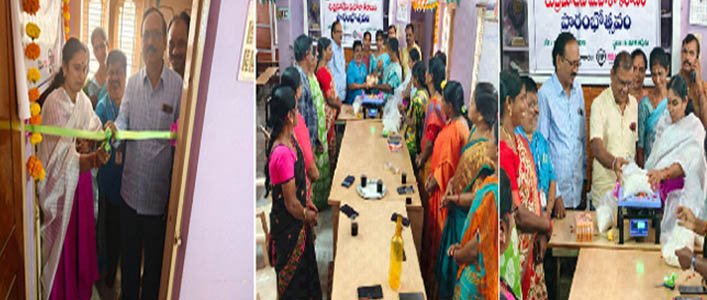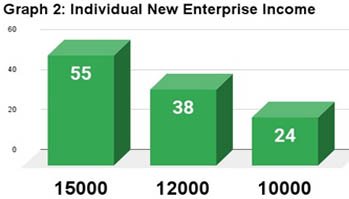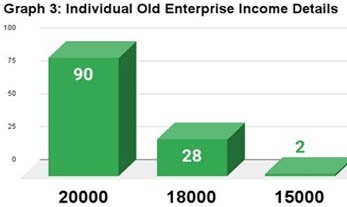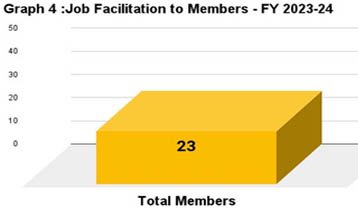HIGHLIGHTS FOR FY2023-24
GFATMC-19 Social Protection (SP) and Key Population (KP) Programme
Rudrama Devi Mahila Mandali (RDMM) has implemented the GlobalFundtoFightAIDS,Tuberculosis,andMalaria(GFATM) C-19 SP and KP Grant under Navyasri Mahila Welfare Society, supported through SAATHII and Swathi Mahila Sangha (SMS), to help women in sex work (WSWs) and Transgender (TG) groups overcome barriers in obtaining essential government documents.This initiative has been implemented to facilitate access to key documents like Aadhaar and PAN cards, which are crucial for benefiting from various government schemes. By training facilitators who share similar backgrounds with the beneficiaries, the program empowers the local community and strengthens their ability to access critical support.
The objective of the SP grantisto address the lack of awareness and access to essential documents, such as Aadhaar, PAN cards, community certificates, and bank accounts, Government schemes, among community members. The project aims to provide these services through trained community facilitators, who are also from the community.
GFATMC-19 Social Protection (SP) Programme
The C19 RM project, supported by GFATM, is a significant initiative for Rudrama Devi Mahila Mandali (RDMM) that has positively impacted the community through the Social Protection (SP) and Key Population (KP) Programs. Through the SP Program, we provided support to community members, specifically women in sex work, assisting them with Social Entitlements and Social Scheme requirements.

GOAL of SP Grant: Increase access to the uptake of social protection and HIV services for Key and vulnerable populations in the 14 intervention states across India.
OBJECTIVE:Increase access to social protection and HIV services among Key and Vulnerable populations in multiple states across India (social protection includes – ID Cards / Certificates, DBT enabled Bank / PostOfficeaccounts).
Through this program, we supported 543 members in applying for various Social Entitlements and Social Scheme requirements.Ofwhich 430 members were benefitted, 113 benefitted with Social Entitlements and 153 individuals with Social Schemes.

GFATMC-19 Key Population (KP) Programme
Throughout the year, RDMM in collaboration with Swathi Mahila Sangha (SMS), has made significant strides in empowering women in sexworkofallgendersthroughtheGFATM/C19/RMKey Population grant. This initiative focuses on strengthening RDMM’s capabilities, building resilience, and advocating for the right of women in sex work to live with dignity. Centered in the Hanumakondadistrict, the program amplifies the voices of women in sex work and improves their access to justice and legal support.
GoalofKPGrant: Increasethecapacityofallgendersinsexworkand their CBOs towards building sustainable community mechanism for resilience and right to life with dignity.
OBJECTIVE1: Strengtheninstitutionalcapacityandsustainabilityof 132 CBOs serving women in sex work (F, M, TG) (NNSW 70 CBOs, and TAARAS 62 CBOs).
OBJECTIVE 2: Increase understanding among women in sex work regarding their rights, and enable their access to available socio-legal mechanisms for the prevention and redressal of stigma,discrimination, and violence.
Legal Literacy
A notable achievement of our initiative has been the successful Legal Literacy Campaign, which was meticulously designed to educate and empower community members about their legal rights andprotections.

Key Highlights of th eLegal Literacy Campaign
Appointment and Training of Help Desk Coordinator:
A dedicated Help Desk Coordinat or was appointed tolead the campaign and provide personalized support to community members.
The coordinator underwent comprehensive training on essential legal frameworks, including:
Domestic Violence Act: Addressing protections for individuals in domestic abuse situations.
HIVProtectionAct:Safeguardingtherightsanddignityof individuals living with HIV/AIDS.
TargetAudienceandReach:
Initially aimed at educating 450 individuals, the campaign surpassed its goal by reaching 470 community members.
Extensive Legal Literacy Sessions:
A total of 365 legal literacy sessions were conducted.
Sessions included both one-on-one interactions and group discussions, ensuring personalized and impactful engagement.
The approach fostered a deeper understanding of legal rights andhow to navigate legal systems effectively.
Crisis Support and DLSA Referrals:
10individualsfromcommunityfacingcrisesweresupportedsuchas: Domestic violence
- Family disputes
- Threats or harassment from local goons Client-related conflicts
- Legal challenges
These individuals were provided immediate assistance and referred to the District Legal Services Authority (DLSA) for expert legal aid and resolution.
This campaign has significantly enhanced legal awareness among community members, equipping them with the tools and knowledge to assert their rights and seek justice. It stands as a testament to the power of tailored interventions in addressing critical community needs.
District Level Advocacy Meeting with the support of KP grant, SMS and TAARAS
The district-level advocacy meeting was held in collaboration with DLSA, bringing together participants, including key legal and law enforcement officials, community members, and representatives from various support organizations. This event fostered a collaborative approach to address community legal challenges and strengthened support networks for RDMM members.
The attendees discussed a pivotal Supreme Court observation on women in sex work, issued in May 2022. This event not only heightenedawarenessofthelegalrightsofwomeninsexworkbutalso raised the profile of the RDMM CBO, laying a strong foundation for future advocacy efforts. The meeting featured panel advocates from DLSA, police officials, representatives from DAPCU, DSW, CWC, board members, staff members, and RDMM community members.

CBO Need Assessment
Additionally, a comprehensive needs assessment was conducted to evaluate the operational effectiveness of the CBOs involved in our grant. In collaboration with organizations such as Saathii and Sattva, the assessment revealed that the RDMM CBO is strong and thriving. The findings listed below will be crucial in shaping our strategies to ensure compliance with statutory requirements.
- Legal and Governance: Ensure all legal and governance documentsare filed and documented accurately.
- Provisional Documents: Obtain and update essential documents like 12A and 80G for tax exemptions.
- Website Development: Create and maintain an organizational website for the AJMS CBO.
- Annual Report Support: Provide technical support to compile and design the organization’s annual report.
- CSR Registration: Begin the CSR registration process to expand funding opportunities.
These findings will help guide the next steps in supporting the RDMM CBO and ensuring it meets all legal and operational standards.
Training Program under the KP Grant
Organizational Development and Legal Literacy Training for CBO Leaders
As part of the KP initiative, the SMS team conducted acomprehensive training program on organizational development specifically designed for community-based organization (CBO) leaders. The training aimed to enhance their understanding of CBO status and compliance with legal requirements. Additional sessions covered legal literacy, HIV/AIDS awareness, and pandemic preparedness. Two leaders from RDMM participated in the program, gaining valuable knowledge to strengthen their organizational and community leadership.

IMPACT OF GFATMC-19 KP PROGRAMME
- The outcomes of this program have been significant. Bystrengthening the capabilities of local organizations and raising awareness of legal rights, we have cultivated a more supportive environment for women in sex work. Looking ahead, RDMM is dedicated to advocating for the rights and dignity of all individuals within key populations, ensuring their voices are heard and valued in society.
- Through dedicated advocacy efforts, RDMM has successfully reduced police raids and harassment faced by women in sex work. Additionally, community leaders have gained the confidence and skills to advocate directly with police officers, fostering mutual understanding and respect. This shift reduces conflicts and empowers members to advocate for their rights, creating a safer, more supportive community environment.
- The KP grant has played a vital role in building leadership skillsamong members, who now take ownership of their CBO operations, including independently organizing Board of Directors (BOD)meetings funded through their own resource mobilization efforts. Leaders are now not only aware of the importance of sustainable funding but are also exploring various avenues for resource mobilization, showcasing increased self-reliance and initiative.
- Additionally, the KP project has enabled RDMM to complete essential legal formalities, establishing the CBO as a credible and legally recognized entity. This formalization has reinforced the organization’s position in the community and with local authorities, helping protect members and advocate effectively for their rights.
Launch of RDMM Group Enterprise: Supporting Local Businesses,started in November 2023

Rudrama Devi Mahila Kirana Shop, a group enterprise was launched on November 10, 2023, it serves as a wholesale grocery outlet supporting community-based initiatives. With Social Venture Partner (SVP) support, this enterprise began with an investment of ₹4,50,000 and includes five members who manage the operations. One enterprise member in the group is educated and handles the enterpriseaccounting, tracking income, expenses, stock, and bookkeeping. The enterprise launch was marked by the presence of District TSACS program manager, district ART superintendent, ICTC officials, counselors, and local authorities, showing strong community and official support for this sustainable economic initiative.To date, the RDM group enterprise generates an income of₹70,000per month by supplying wholesale products at competitive prices to community members who run individual grocery stores locally. This model not only supports local business owners but also contributes to the essential resource mobilization for the CBO.Photosof“InaugurationofRDMGroupEnterpriseWholesale Grocery Initiative”
Total of 120 Members Have Received Livelihood Support from RDMM
In Partnership with Support Venture Partner, RDMM supported 120 members from Below Poverty Line (BPL) backgrounds in establishing sustainable livelihoods. The program identifies individuals with a pressing need for economic support and helps them leverage social schemes and bank loans to initiate income-generating activities. Through these efforts, 120 members have been directly supported to start theirown livelihood ventures.

Photos of Community Members Engaged in Livelihood Activities

KEY PROGRAMS & PROGRESS-FY 2023-24
In collaboration with the Tripura State AIDS Control Society (TSACS), funded by the State AIDS Control Society (SACS), RDMM focuses on preventing HIV/AIDS by targeting high-risk groups. The organization promotes HIV testing, facilitates access to treatment, and works to reduce stigma surrounding HIV/AIDS. RDMM ensures that affected communities receive necessary healthcare services, including antiretroviral therapy (ART), and provides ongoing social support to improve the well-being of individuals living with HIV.
The TSACS Targeted Intervention (TI) Programme plays a vital role in HIV/AIDS prevention by registering and supporting high-risk groups (HRGs) women in sex work (WSWs). Total of 2,548 WSWs are registered with TI as of March 2024. We identified 300 HRGs for HIV/AIDS in the FY 2023-24 and referred them for testing, treatment, and care. Additionally, ongoing support is provided, offering counseling and various services to address crises, social entitlements, and other health-related needs.
The TI graph shows, the program has registered 2548 FSWs and identified 70 individuals with PLHIV. A total of 6,238 individuals are regularly engaged in Designated STI/STD Clinics (DSRC) for specialized healthcare services. Further, 6234 individuals received ongoing medical care. The data demonstrates our effective outreach to the community, emphasizing the need for ongoing encouragement for HIV testing and treatment.

As part of the TI Programme, significant emphasis is placed on ensuring that all sexual encounters among high-risk groups (HRGs), WSW and TG are protected through the consistent and correct use of condoms. As per this condoms are distributed as per the requirement in the community.
The Graph shows 61% of condom was distributed in the community. We are actively working to bridge the gap of 59% through increased outreach efforts, improved distribution channels, and collaboration with community leaders.
The program supports 70 members (PLHIVs) with essential linkages to Antiretroviral Therapy (ART), ensuring they receive their monthly ART medications. In addition to medical support, each member benefits from a monthly pension of ₹2,000 and counseling services, which provide both emotional and psychological support.

To enhance their nutrition, we support members with nutritional foods like jaggery, peanuts, and wheat flour—items made possible by motivated donors. Based on members’ needs and requirements, this nutritional support is provided to 30 or 20 members at a time, ensuring tailored assistance to those in greatest need.
This initiative is sustained by contributions from local donors, like wholesale grocery store and governmental departments etc. This collaborative effort between the community, local donors, and volunteers underscores a holistic approach to healthcare and social support for individuals on ART.
During the reporting period, we prioritized syphilis testing as part of our comprehensive sexual health services. Syphilis, a sexually transmitted infection caused by the Treponema pallidum bacterium, can lead to serious health complications if left untreated. Early detection and intervention are crucial for effective management and prevention of transmission. As shown in below graph, a total of 2,19 individuals were referred for syphilis testing. Out of these, only four individuals tested positive and was promptly referred for treatment and follow-up care to ensure a full recovery and prevent further transmission.

As shown in the graph, a total of 2,194 individuals were referred for syphilis testing. Out of these, only four individuals tested positive and was promptly referred for treatment and follow-up care to ensure a full recovery and prevent further transmission.As shown in below graph, a total of 2,194 individuals were referred for syphilis testing. Out of these, only four individuals tested positive and was promptly referred for treatment and follow-up care to ensure a full recovery and prevent further transmission.

Our vision is to innovate and make healthcare accessible to everyone, ensuring that families in villages lead healthy lives, fostering productivity and overall well-being in daily life.
We address Non-Communicable Diseases (NCD) health conditions that often go unnoticed. Through health camps organized in collaboration with PHCs and government health departments, we conduct thorough screenings, tests, and treatments to identify and address these issues. Our approach emphasizes analyzing root causes and supporting individuals through follow-up, monitoring, and referrals to government hospitals for treatment, cure and management of NCD health conditions. This ensures timely intervention and sustained care, helping individuals lead healthier, more comfortable lives.

The graphs for Anemia, Hypertension and Diabetes shows the breakdown of the individuals, who were risk assessed, screened and tested, provided treatment and managed for identified condition through NCD health camps.
Our approach emphasizes analyzing root causes and supporting individuals through follow-up, monitoring, and referrals to government hospitals for treatment, cure and management of NCD health conditions. This ensures timely intervention and sustained care, helping individuals lead healthier, more comfortable lives.


We have supported 130 members in accessing credit facilities to improve their livelihoods. These members are part of Self-Help Groups (SHGs), where they engage in financial activities such as maintaining individual savings accounts, SHG group accounts, and utilizing inter-loan facilities within the SHGs, with the approval of all group members.
SHGs maintain savings accounts in local banks, such as Union Bank, Bank of Baroda, SBI, Corporation Banks, and Bandhan Bank, and also receive loan support through Mepma’s Srinidhi program. When a member requires a loan, the SHG secures it against the group’s bank account.

The loan amount is transferred to the member’s individual account, with repayment managed collectively through the SHG account. Field workers identify eligible members within SHGs and assist in accessing credit, with loan amounts ranging from ₹10,000 to ₹5 lakhs, provided by Corporation Banks and other financial institutions.This credit support from RDMM enables members to access the necessary credit facilities to improve their livelihoods and financial stability.

In Partnership with Support Venture Partner, we initiated a livelihood Program, which is a targeted initiative aimed at supporting members from Below Poverty Line (BPL) backgrounds who are actively involved in health groups and show interest in establishing sustainable livelihoods. The program identifies individuals with a pressing need for economic support and helps them leverage social schemes and bank loans to initiate income-generating activities. Through these efforts, 120 members have been directly supported to start their own livelihood ventures in FY 2023-24.
Additionally, 1,200 members have participated in financial literacy sessions, which equip them with essential knowledge about budgeting, savings, and financial management—skills that are crucial for sustaining and growing their livelihood efforts. This program reflects a comprehensive strategy that combines financial education, resource access, and social support, empowering low-income community members to achieve economic stability.
SVP PROJECT OUTCOME AND IMPACT REPORT

Graph 1 shows that in FY 2023-24, RDMM supported 117 members in starting new enterprises, while also continuing to support 120 members who are successfully running existing enterprises (old enterprise). The focus was on capacity building to strengthen and develop these enterprises, aiming for their long-term sustainability.
Graph 2 illustrates the monthly income earned by individuals from new enterprises in FY 2024-25. The graph breaks down the income into three brackets: ₹15,000,₹12,000, and ₹10,000 per month. Notably, 47% of individuals are earning ₹15,000 per month. RDMM continues to conduct capacity-building sessions with these enterprises to strengthen and ensure their sustainability.


Graph 3 illustrates the monthly income earned by individuals from established enterprises in FY 2023-24. The income is divided into three brackets: ₹20,000, ₹18,000, and ₹15,000 per month. Notably, 75% of individuals are earning ₹20,000 per month. RDMM continues to provide capacity- building sessions for both new and existing enterprises to enhance their sustainability and growth.
Graph 4 illustrates that 23 members have been provided with job facilitation and placements across various sectors, including sales, housekeeping, positions in shopping malls, and as workers in packaging companies. These individuals now have a consistent monthly income to support their livelihoods.


The graph 5 illustrates the monthly returns from four key initiatives under the Social Venture Partner (SVP) program, which has significantly impacted the community by fostering sustainable income opportunities.
These initiatives include New Enterprises, where individuals or groups have started new businesses with SVP’s support, creating jobs and generating income; Old Enterprises, which have been revitalized or expanded with additional resources, helping existing businesses grow and thrive; Individuals Earning from Job Placements, tracking the success of those who have secured stable employment through the program, ensuring a consistent income; and RDM Group Enterprises, where collective businesses are formed, allowing participants to share risks and rewards. Through these diverse initiatives, the SVP program has empowered community members to not only achieve financial independence but also contribute to local economic growth, fostering a sense of self-reliance and collaboration.
The TAARAS is a national level coalition, which plays a pivotal role in addressing community issues, supporting Community-Based Organizations (CBOs) in Telangana and other locations in the India. This program works closely with nine CBOs, including RDMM, to tackle local challenges faced by community organizations, through the development of action plans, strategic frameworks, and solutions tailored to the needs of the community. Monthly meetings are conducted on a monthly basis, where CBOs receive guidance and support from the National Coalition, technical expertise from Swasti Health Catalyst, and collaborative engagement with government officials, donor networks, and non-governmental organizations. Through this program, the goal is to strengthen CBO operations, enhance sustainability, and foster partnerships that benefit the communities they serve.

